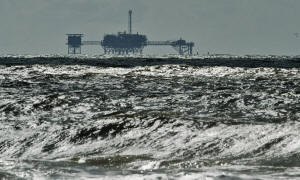Environmental groups lose bid to undo Gulf of Mexico drilling leases
 Send a link to a friend
Send a link to a friend
 [April 29, 2023]
By Clark Mindock [April 29, 2023]
By Clark Mindock
(Reuters) - Offshore drilling leases covering 1.7 million acres of
federal waters in the Gulf of Mexico will remain in place after a
federal appeals court said last year's $430 billion Inflation Reduction
Act, the biggest climate change package in U.S. history, mandated they
be issued to the highest bidders.
A three-judge panel of the U.S. Court of Appeals for the District of
Columbia said the law, which instructed the U.S. Interior Department to
issue leases for winning bids it received from companies such as
ExxonMobil Corp. and Chevron Corp. during a November 2021 sale, meant
there was no longer a dispute for it to decide.
The department's Bureau of Ocean Energy Management had cited the law
last year when it reinstated the leases from the 2021 sale even though
U.S. District Court Judge Rudolph Contreras in Washington, D.C., had
vacated the auction in early 2022, saying the Biden administration
failed to properly account for its impact on climate change.
The D.C. Circuit said the law "makes clear" that those leases are no
longer subject to requirements of the National Environmental Policy Act,
which requires a thorough look at environmental impacts of proposed
major federal actions.

The companies had collectively bid more than $191 million for the
leases.
The Inflation Reduction Act included billions of dollars of funding to
address climate concerns, but also protected federal drilling auctions
President Joe Biden had previously promised to end.
The state of Louisiana and the American Petroleum Institute appealed
Contreras' decision to the D.C. Circuit but later argued the case was
moot given the passage of the law.
But environmental groups Friends of the Earth, Healthy Gulf and the
Sierra Club maintained that, despite the law's mandate, the leases could
still be modified or even revoked due to flaws in the environmental
review already identified by the lower court. They had also argued the
D.C. Circuit should send the case back to Contreras to analyze how the
law impacted his decision.
[to top of second column]
|

An oil and gas drilling platform stands
offshore as waves churned from Tropical Storm Karen come ashore in
Dauphin Island, Alabama, October 5, 2013. Tropical Storm Karen
continued to weaken on Saturday as it approached the Louisiana coast
after prompting the evacuation of some low-lying coastal areas and
disrupting U.S. energy output in the Gulf of Mexico. REUTERS/Steve
Nesius

Earthjustice attorney Steve Mashuda, who represented the
environmental groups, said in a statement that the decision will
harm Gulf communities and ecosystems.
Louisiana Solicitor General Elizabeth Murrill, in a statement,
called the decision a "victory" for the state and affordable energy.
A spokesperson for the American Petroleum Institute called the order
a “positive step toward more certainty and clarity for energy
producers.”
The Interior Department, which did not appeal the lower court
decision, declined to comment.
The case is Friends of the Earth et al. v. Debra Haaland et al.,
U.S. Court of Appeals for the District of Columbia Circuit, case No.
22-5036.
For the environmental groups: Erik Grafe, Brettny Hardy, Steve
Mashuda and Shana Emile of Earthjustice
For the American Petroleum Institute: Cate Stetson and Sean Marotta
of Hogan Lovells, and Jonathan Hunter and Sarah Dicharry of Jones
Walker
For Louisiana: Attorney General Jeff Landry, Solicitor General
Elizabeth Murrill and Deputy Solicitor General Joseph Scott St.
John, and Tyler Green and Jeff Hetzel of Consovoy McCarthy
(Reporting by Clark Mindock)
[© 2023 Thomson Reuters. All rights
reserved.]This material may not be published,
broadcast, rewritten or redistributed.
Thompson Reuters is solely responsible for this content.
 |